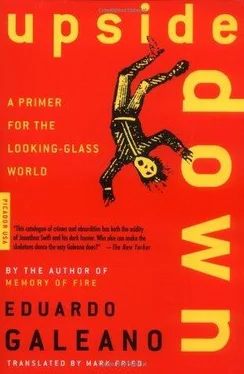Advertising enjoins everyone to consume, while the economy prohibits the vast majority of humanity from doing so. The command that everybody do what so many cannot becomes an invitation to crime. In the papers, crime stories have more to say about the contradictions of our times than all the articles about politics and economics.
This world, which puts on a banquet for all, then slams the door in the noses of so many, is simultaneously equalizing and unequal: equalizing in the ideas and habits it imposes and unequal in the opportunities it offers.
EQUALIZATION AND INEQUALITY
Twin totalitarianisms plague the world: the dictatorships of consumer society and obligatory injustice.
The machinery of compulsory equalization works against the finest trait of the human species, the fact that we recognize ourselves in our differences and build links based on them. The best of the world lies in the many worlds the world contains, the different melodies of life, their pains and strains: the thousand and one ways of living and speaking, thinking and creating, eating, working, dancing, playing, loving, suffering, and celebrating that we have discovered over so many thousands of years.
Equalization, which makes us all goofy and all the same, can’t be measured. No computer could count the crimes that the pop culture business commits each day against the human rainbow and the human right to identity. But its devastating progress is mind-boggling. Time is emptied of history, and space no longer acknowledges the astonishing diversity of its parts. Through the mass media the owners of the world inform us all of our obligation to look at ourselves in a single mirror.
Whoever doesn’t have, isn’t. He who has no car or doesn’t wear designer shoes or imported perfume is only pretending to exist. Importer economy, impostor culture: we are all obliged to take the consumer’s cruise across the swirling waters of the market. Most of the passengers are swept overboard, but thanks to foreign debt the fares of those who make it are billed to us all. Loans allow the consuming minority to load themselves up with useless new things, and before everyone’s eyes the media transform into genuine needs the artificial demands the North of the world ceaselessly invents and successfully projects onto the South. (“North” and “South,” by the way, are terms used in this book to designate the carving up of the global pie and do not always coincide with geography.)
What about the millions upon millions of Latin American children who will soon be condemned to unemployment or hunger wages? Does advertising stimulate demand or, as seems more likely, incite violence? Television gives us the full treatment: it teaches us to confuse the quality of life with the quantity of things and offers daily audiovisual courses on violence with video games for extra credit. Crime is the biggest hit on the small screen. “Strike first before they strike you,” caution the video game professors. “You’re all alone. Don’t count on anyone else.” Cars fly, people explode: “You, too, can kill.” Meanwhile, in Latin America’s cities, among the largest in the world, crime grows at an alarming rate.
The Exception
There is only one place in the world where North and South meet on an equal footing: a soccer field at the mouth of the Amazon in Brazil. The equator cuts right through the middle of Zerão stadium in Amapá, so each team plays one half in the South and the other half in the North.
The world economy requires consumer markets in perpetual expansion to absorb rising production and keep profit rates from falling. It also requires ridiculously cheap labor and raw materials to keep production costs down. The same system that needs to sell more and more needs to pay less and less. This paradox gives birth to another: to increase the number of consumers, the North issues ever more imperious orders to consume to the South and the East, but the number of criminals multiplies even faster. Muggers seize the fetishes that make people real, in order to become what their victims are. Glove thy neighbor: in the madhouse of the streets, anyone can be dealt a punch or a bullet, those born to die of indigestion as well as those born to die of hunger.
Cultural equalization, the process of casting all in the single mold of consumer society, can’t be reduced to statistics, but inequality can. The World Bank, which does so much to encourage inequality, freely admits — and several agencies of the United Nations confirm — that never has the world economy been less democratic, never has the world been so scandalously unjust. In 1960, the richest 20 percent of humanity had thirty times as much as the poorest 20 percent. By 1990, that figure had increased to seventy times. And the scissors continue to open: in the year 2000 the gap will be ninety times.
Between the richest of the rich, who appear on the pornofinancial pages of Forbes and Fortune, and the poorest of the poor, who appear on the streets and in the fields, the chasm is even greater. A pregnant woman in Africa is a hundred times more likely to die than a pregnant woman in Europe. The value of pet products sold annually in the United States is four times the GNP of Ethiopia. The sales of just the two giants General Motors and Ford easily surpass the value of all black Africa’s economies. According to the United Nations Development Program, “Ten people, the ten richest men on the planet, own wealth equivalent to the value of the total production of fifty countries, and 447 multimillionaires own a greater fortune than the annual income of half of humanity.” The head of this UN agency, James Gustave Speth, declared in 1997 that over the past half century the number of rich people doubled while the number of poor tripled and that 1.6 billion people were worse off than they had been only fifteen years earlier.
Not long before that, the president of the World Bank, James Wolfensohn, threw cold water on the annual meeting of the bank and the International Monetary Fund. He warned those celebrating the achievements of the world government run by those two bodies that if things continue as they are, in thirty years there will be five billion poor people in the world, and inequality will explode in the face of future generations. Meanwhile, an anonymous hand wrote on a Buenos Aires wall, “Fight hunger and poverty! Eat poor people!”

As if to confirm our optimism, as Mexican writer Carlos Monsiváis suggests, the world carries on: the injustice that rules between countries is reproduced within each country, and year after year the gap between those who have everything and those who have nothing widens. We know it well in the Americas. In the United States half a century ago, the rich earned 20 percent of national income; now they get 40 percent. And in the South? Latin America is the most unjust region in the world. Nowhere else are bread and fish distributed as unfairly; nowhere else does such an immense distance separate the few who have the right to rule from the many who have the duty to obey.
Latin America is a slave economy masquerading as postmodern: it pays African wages, it charges European prices, and the merchandise it produces most efficiently is injustice and violence. Official statistics for Mexico City from 1997: 80 percent poor, 3 percent rich, the rest in the middle. The same Mexico City is the capital of the country that in the 1990s spawned more instant multimillionaires than anywhere else on earth: according to UN figures, one Mexican has as much wealth as seventeen million of his poor countrymen.
Читать дальше












